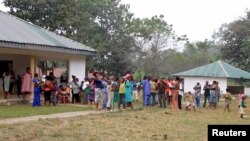Thousands of English-speaking Cameroonians continue to flee violent crackdowns by government forces.
The U.N. refugee agency has registered more than 20,000 Cameroonian refugees in Nigeria's Cross River, Taraba, Benue and Akwa-Ibom states. An overwhelming majority are women and children.
A recent assessment mission by the UNHCR and several other U.N. agencies presents a dismal picture of the conditions under which the refugees are forced to live, with barely enough food to survive.
The agencies say most families are down to one meal a day. They lack clean water and risk getting sick from drinking water from unsafe streams and ponds.
UNHCR spokeswoman Aikaterini Kitidi says the asylum seekers lack essential relief items and have no proper or independent shelters that can protect them from the cold. She warns this already grim situation is likely to worsen as the rainy season begins.
"Malaria is reportedly already on the increase. Children commonly exhibit rapid breathing and coughing.Many participants at the assessment were suffering from fear and anxiety, poor sleep and flashbacks. In all, about 20 to 30 percent of the asylum seekers have some kind of vulnerability, such as a physical disability," said Kitidi.
Residents of Cameroons two English-speaking provinces have long felt marginalized by the government. Their grievances erupted into deadly protests toward the end of 2016. Tensions between the English and French speaking communities have continued to build, culminating with the first mass exodus of refugees into Nigeria in October 2017.
Kitidi told VOA the situation in some parts of Cameroon continues to be very tense.
"There is still military presence and curfews that are ongoing. For UNHCR, it is important for the government of Cameroon to explore ways in which to engage with all those who feel aggrieved for the sake of peace.We also reiterate the need for the respect of human rights by all parties involved," she said.
Kitidi said the UNHCR will continue to assist the refugees for as long as possible. Unfortunately, she says the outlook is bleak as her agency is out of funds. She said no money has been received to implement the agency's $18 million humanitarian operation for Cameroon refugees this year.
Thousands of Anglophone Cameroonians Continue to Flee to Nigeria
- By Lisa Schlein

GENEVA, SWITZERLAND —







